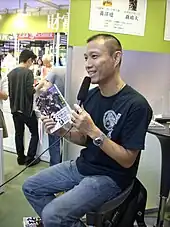Jozev Kiu Ching-Fu | |
|---|---|
 Jozev Kiu in 2011 | |
| Born | Lau Wai Ming (劉偉明) 6 February 1969 |
| Education | The City University of Hong Kong (BA) |
| Alma mater | Cheung Sha Wan Catholic Secondary School, The City University of Hong Kong |
| Notable work | Blood and Steel (2008) |
Jozev Kiu Ching-Fu (Chinese: 喬靖夫; born 6 February 1969) is a Hong Kongese wuxia novelist, lyricist and Eskrima coach. His magnum opus, Blood and Steel, had received widespread acclaim and Kiu is regarded as one of the leading figures of the post-Jin Yong Hong Kong Wuxia fiction genre.[1][2]
Early life and education
Kiu was born in Hong Kong on 6 February 1969. He had his secondary education in Cheung Sha Wan Catholic Secondary School and was classmate with lyricist Chow Pok Yin.[3] He began to learn karate while he was 15 and he spent most of his secondary school life on basketball, gaming and reading manga.[4] He later attended The City University of Hong Kong and graduated with a bachelor's degree in translation.[2][5]
Career
Writing
Kiu began to write Wuxia fiction and completed his first novel, The Unparalleled Statesman (Chinese: 國士無雙), during his university years.[2] Kiu published his debut novel The Blade of the Phantom Kingdom (Chinese: 幻國之刃) in 1996, and he began to receive public attention. He later also wrote The Vampire Hunter’s Diaries (Chinese: 吸血鬼獵人日誌) and The Killing Zen (Chinese: 殺禪), of which the latter took Kiu ten years to finish.[2] The lengthy writing process earned him the nickname of “Hong Kong’s greatest procrastinating writer” (Chinese: 香江第一遲筆).[2]
In 2008, he started another novel series, Blood and Steel (Chinese: 武道狂之詩), and published it online. The series was generally perceived as a milestone of the reformed Hong Kong Wuxia genre as it differed from the traditional Wuxia fiction which put emphasis on the code of chivalry and Chinese traditions.[6] Besides, Kiu was also one of the few Wuxia novelists who possessed a martial arts background, and the realistic action sequences in the novel series received universal praise.[1] After the success of Blood and Steel, Kiu was widely regarded as a leading figure of the New Wuxia genre in the post-Jin Yong era.[1]
Kiu had also composed lyrics for Cantopop songs since 1998. He won the Yearly Best Lyricist Prize of the Composers and Authors Society of Hong Kong in 2000 with Candy Lo's Dark Blue (Chinese: 深藍).[7]
Martial arts
Kiu is skilled in karate, Wing Chun and Eskrima.[2] Kiu began to learn karate when he was 15 and obtained a brown belt.[8] He began to practice Eskrima in 2009 and participated in several international competitions.[9] He had also received professional training in the Philippines in 2012,[9] and served as a guest host of the RTHK martial arts documentary series, Kung Fu Quest (Chinese: 功夫傳奇), for several years.[8] He also co-founded and taught at Kalis Brotherhood, an Eskrima coaching school.[10]
Personal life
Kiu was married in March 2011.[11]
Kiu was a supporter of the Anti-Extradition Law Amendment Bill Movement. He wrote essays to express his political views and had compared the protests with Bruce Lee’s philosophy of errantry.[12]
Bibliography
References
- 1 2 3 4 "《武道狂之詩》- 香港新派武俠小說,武打場面非常有真實感,不過故事有點平舖直述". Inmedia. 15 February 2021. Archived from the original on 11 January 2022. Retrieved 28 September 2022.
- 1 2 3 4 5 6 7 8 9 黃子翔 (11 June 2016). "紅人熱事——打出一片天 喬靖夫新武俠掌門人". Headline Daily. Archived from the original on 28 September 2022. Retrieved 28 September 2022.
- ↑ "【開心速遞】張明偉劇內外都屬資優生 長沙灣天主教英文中學畢業入美國名牌大學【有片】". Topick. 22 April 2021. Archived from the original on 2 August 2022. Retrieved 28 September 2022.
- ↑ "運動非主流/空手道精神 啟蒙喬靖夫作家路". ETToday. 10 March 2015. Archived from the original on 11 January 2016. Retrieved 28 September 2022.
- ↑ "【JORDAN BRAND大專籃球賽】浸大主場擊敗七人城大躋身四強". Yahoo! News. 8 August 2017. Archived from the original on 28 September 2022. Retrieved 28 September 2022.
- ↑ "筆墨出江湖 書展論英雄". Wen Wei Po. 29 June 2016. Archived from the original on 13 September 2017. Retrieved 28 September 2022.
- ↑ "Official website of the Composers and Authors Society of Hong Kong". Composers and Authors Society of Hong Kong.
- 1 2 "也文也武喬靖夫". Hong Kong Economic Journal. 3 May 2016. Retrieved 28 September 2022.
- 1 2 Nic Wong (10 October 2019). "唯快不破老而堅 喬靖夫". JET Magazine. Archived from the original on 28 September 2022. Retrieved 28 September 2022.
- ↑ 李嘉譽 (5 November 2019). "【菲律賓魔杖】世界冠軍師徒Andy 民安︰打破高牆發展香港魔杖". HK01. Archived from the original on 28 October 2021. Retrieved 28 September 2022.
- ↑ 莊漢波 (1 April 2011). "夜訪喬靖夫:與一位奮鬥不懈的小說家對話". 明日武俠. Archived from the original on 16 June 2019. Retrieved 28 September 2022.
- ↑ 戈登探長 (5 July 2019). "Be water!一代宗師李小龍與香港抗爭者". The News Lens. Archived from the original on 20 September 2021. Retrieved 28 September 2022.